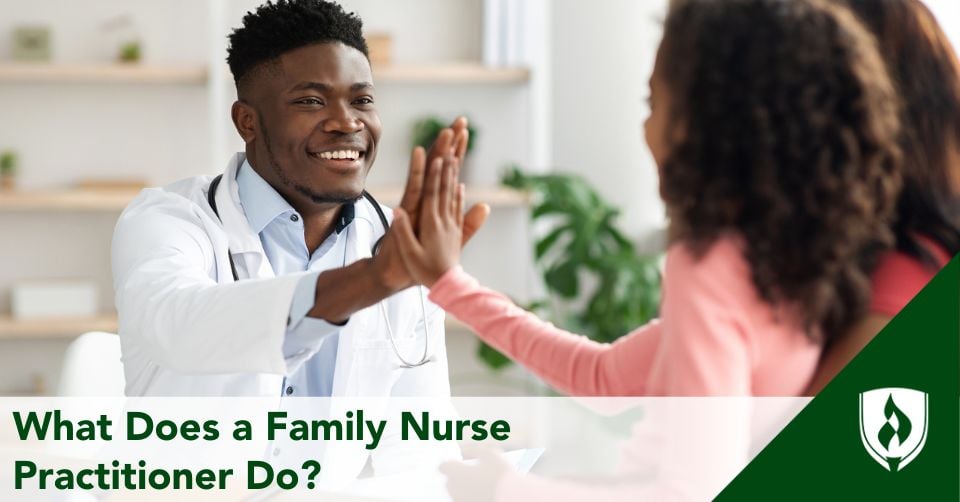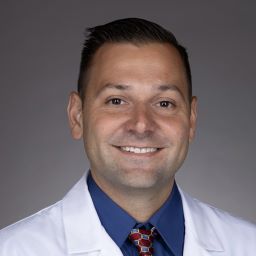
Nurses have a tendency to step into the gaps. They care for patients in ways the larger healthcare system is missing—and they often find those sore spots where healthcare is inaccessible or ineffective. When you see that, as a nurse, you want to do something about it. This is exactly how the role of family nurse practitioner (FNP) came about.
A family nurse practitioner is an advanced practice registered nurse (APRN) role created to help address healthcare disparities in rural areas.
At the time of inception, the first Nurse Practitioner program was a "primary care program" and was designed to expand the role of nurses into well-child care and health promotion. This nurse practitioner program caused a ripple effect, and many other programs sprouted up over the next decade.
FNPs work in many ways, from disease prevention to chronic health conditions. Family nurse practitioners cover a broad scope of patient care. When you attend a nurse practitioner graduate program, you will learn to care for patients across the lifespan.
What are the duties of Family Nurse Practitioners?
The scope of practice for family nurse practitioners is set (usually) by your state's board of nursing. So there will be differences in what APRNs in primary and specialty care can do from place to place.
The way you'll deliver care is based in the fundamentals of family nursing practice principles. As the family nurse practitioner, you will be seen as a primary care provider in the healthcare system. What makes family nurse practitioners special is—not only do they develop treatment plans like other healthcare providers, they also use their nursing training to empower and educate patients of all ages on healthy living and well-being.
The healthcare services family nurse practitioners provide include the ability to prescribe medications, including scheduled drugs.
When I started as a family nurse practitioner in Florida, we did not have the ability to obtain a DEA license and thus could not prescribe scheduled medications. Many laws have changed since then and have given nurse practitioners full authority in prescribing medications without restrictions.
As an FNP, I learned to focus on the patient with a holistic approach. A patient's condition is just one part of their comprehensive care. Your duties in a nutshell are allow you to provide a vital role in the delivery of healthcare services.
Additionally, our job duties as primary care providers include performing physical exams, and if medically necessary, we are allowed to order diagnostic tests when providing care services to patients.
You will also have the education and authority to order consults with other specialists. From ordering labs, x-rays, CT scans and vaccines to wound closure with sutures and staples; our ability to provide complete care is what made my career as an FNP so exciting and rewarding.
Family nurse practitioner roles beyond primary care
The family nurse practitioner role is actually very diverse. Traditionally, FNPs worked in family practice, and while that's still common, there are many different venues you can provide primary care services in.
Community health clinic FNPs
My first practice setting was working with community health centers where I managed my own panel of patient records. You can provide primary care in private group practices, private clinics, hospital outpatient clinics, community health centers, etc.
Emergency department family nurse practitioners
FNPs play different roles and work in many specialties. I had a nurse practitioner NP classmate of mine, who right after graduating, went to work in the emergency room. She never left that position and it has been almost 10 years now!
Urgent care family nurse practitioners
After working in primary care, I decided to check out the other options I had. I took a job at an urgent care. This was in a large hospital-owned practice setting with many urgent care centers. I personally loved this specialty care and spent almost four years in it.
First assist FNPs in surgery centers
If ER is not for you, you can work in the surgical arena, as a first assist to a surgeon. There are many general surgeons, cardiac thoracic surgeons, orthopedic surgeons, to name a few, that employ FNPs as their first assist in surgery.
FNPs in specialty healthcare services
So you don't like surgery because there’s too much blood? What about working in cardiology, nephrology, or neurology?
I have several former coworkers who are involved with Botox and obesity management. With an FNP degree, you can work under a physician specialist and provide care for these specific patients.
Working in education as an FNP
If clinical work is not your schtick, you can always teach like I am doing at Rasmussen!
Educating the future healthcare professionals of America is a noble way to give back to society as well. There are too many positions and roles to name in this article, and I felt my possibilities were endless.
It's easy to find work you love as a family nurse practitioner with so many different healthcare settings.
Job outlook for advanced practice registered nurses
Now is a great time to start a career as an FNP.
The labor statistics for the profession are impressive. According to the US Bureau of Labor Statistics (BLS), Family Nurse practitioner employment is projected to grow 40% from 2023 to 2033.
The BLS reports that nurse practitioners are projected to the third fastest-growing occupation from 2023 to 2033.
The reason for this speed is the coming wave of retiring Baby Boomers, projected to worsen the current health care shortage. Every major nursing and medical association is predicting a shortage in providers of primary care services and even certain specialty care areas.
This will leave a large hole for FNPs to fill. With our versatility, we can cover primary care, emergency care, and various other specialties.
The states with the highest employment levels for nurse practitioners (in order) are: Florida, California, Texas, New York, and Tennessee.
What's the difference between a physician assistant and an FNP?
You may have heard of other healthcare professionals that seem to have similar tasks as FNPs. The physician assistant (PA) is usually lumped into the "Advanced Practice Provider" genre.
It is true that both types of professionals are involved in direct patient care. The FNP and PA both develop treatment plans, order diagnostic tests, and can be deemed primary care providers for their patients. Both work in many different roles in healthcare such as in the ER, surgery setting, specialists, etc.
And you need a master's degree to become board-certified in both professions.
Where PAs and FNPs differ is mainly in their healthcare background.
Most FNPs have worked thousands of hours at the bedside with their RN license before they became board-certified FNPs. Most PA programs do require a certain amount of "clinical hours", I've seen 500-1000 hours (several months), before they allow you to enter a graduate program. Many potential physician assistant students will complete this several-month requirement working as a CNA (certified nursing assistant), EMT, paramedic, home health aide, etc.
So, one of the main differences between physician assistants and family nurse practitioners is that NPs tend to have more clinical bedside experience.
The education and training is also different in both professions. At the FNP level, we are taught to treat the patients holistically. We build on our base as registered nurses, growing the nursing fundamentals we learned and experienced at the RN level.
In our graduate nursing education, we get a more in-depth understanding of pharmacology, pathophysiology, and hands-on clinical hours. This makes educating patients a larger part of the FNP scope.
The physician assistant model is based on the allopathic medicine model, with similar courses that are completed in an abbreviated fashion.
The PA profession was designed to extend the care of medical and osteopathic physicians in a supervised fashion.
Full practice authority vs. restricted practice for NPs
The scope of practice for FNPs has changed greatly since I joined the profession a decade ago. Currently, 27 states allow FNPs to practice independently, without a supervising physician. This is called "Full Practice Authority."
Some states allow you to be an independent practitioner as soon as you obtain your FNP certification. Other states will allow you independent practice after one to three years of direct supervision by a physician.
The other 23 states require you to work under the supervision of a physician. This is considered "restricted practice." The laws on how it works will vary per state, but they can include that the NP is required to have a physician involved in the care, discussing the treatment plan, or even meeting some patients.
My state of Florida is considered a "Restrictive State", so I had a physician I could call and who was supposed to review and sign off on my patients' charts.
Both types of practice still allow you to ultimately care for patients. Laws are always changing, and the trend is in favor of supporting the FNP.
For example, after I went off to medical school, my home state of Florida passed legislation that allows FNPs autonomy in primary care practice. The requirements in my state are to work 3,000 supervised hours with an allopathic or osteopathic physician over the last five years.
After you meet these requirements, you can apply to the state, and they will grant you Full Practice Authority in primary care. I personally had no problem caring for patients under the "supervision" of a physician. I saw it as having another healthcare provider helping me, if needed, to deliver the best quality care I could give.
How to become a family nurse practitioner
There are several entry points to becoming a family nurse practitioner. All require you to at least have an associate degree in nursing, as this is the minimal requirement to become a registered nurse. After this, the most traditional way is to enroll in a science in nursing BSN.
A BSN program at Rasmussen University is mostly online and allows you to continue working full-time. Once you complete a BSN at Rasmussen University, you can enroll in their science in nursing MSN with an family nurse practitioner FNP focus track. This allows you to sit for national certification after graduation.
There are other routes as well. I first completed my Associate degree in nursing, sat for the NCLEX, and started working as an registered nurse. From there, I took an RN to MSN (master of science in nursing) pathway since I already had bachelor’s degrees in marketing and accounting.
FNP certification through the ANCC vs. AANPCB
There are two main organizations that nationally certify family nurse practitioners. The organization I was board-certified with was the American Nurses Credentialing Center (ANCC).
The other national certifying organization is the American Association of Nurse Practitioners Certification Board (AANPCB). Each organization will qualify you to earn certification as an FNP.
Every FNP role I come across, from hospital outpatient clinics to private physician practices, almost always required a board certification--but does not favor one or the other. At the end of the day, both the ANCC and AANPCB both test the same material and are equal to employers.
Go with whichever credential your graduate program recommends. If you are able to choose which one, go with the certifying body that has a testing center and preferable testing date closest to your home.
Why should I become an FNP?
You have many good reasons to become an FNP! From personal growth as a nurse to being the solution to the primary care shortage, nurses who take the FNP route have a very rewarding role.
You can be the reason your patients are excited to follow a treatment plan and improve their well-being.
I cannot find a reason to tell you no! My life was forever changed when I became an FNP. So many doors opened not just for me, but for many of my peers in the profession as well. As Gandhi once said, "Be the change you wish to see in the world". Family nurse practitioners get to do just that.
So, what about the logistics? To get details about program entry requirements, tuition, courses or what family nurse practitioners learn, check out the Rasmussen University MSN-NP program page.
Have questions about transfer credits, license requirements or your specific experience? Fill out the "request more information" form on the page to hear from an admissions representative.

